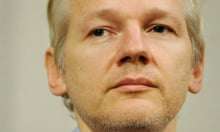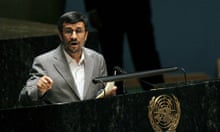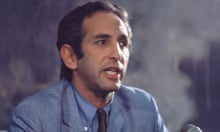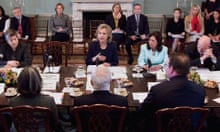Now that the dust over the US embassy cables is beginning to settle, WikiLeaks finds itself at a crossroads. To effectively continue its war on government secrecy, it will need to make fundamental adjustments to how it operates – with no guarantees that the new, more mainstream WikiLeaks will be in much demand.
Its other option is to sidestep its transparency work, delegate it to more nimble and decentralised WikiLeaks-clones, and focus on solving a problem that is likely to be a determining factor in the success of this nascent global transparency movement. It's only by making the publishing of leaked materials insusceptible to the whims of corporate intermediaries such as Amazon or PayPal as well as by increasing its resilience against cyber attacks and other forms of political and legal pressure that this movement can succeed. In other words, Julian Assange's other option is to dedicate himself to campaigning on freedom of expression issues, with the explicit goal of creating technical infrastructure that would allow the next generation of WikiLeaks-clones to remain uncensorable.
Why can't WikiLeaks just continue as it is? If anything, the US embassy cables have made it clear that the success of a WikiLeaks campaign greatly depends on who gets to analyse the leaks and who gets to publicise them.
None of these two activities can currently be done in-house and WikiLeaks has to partner media outlets such as the Guardian and Der Spiegel, borrowing their journalists and essentially making them serve as both "data analysts" (who go through the leaked material to separate the important from the trivial) and "advocacy co-ordinators" (who write articles on issues that WikiLeaks finds important – even though in reality it has little editorial control over what gets written in the end).
As it grows, WikiLeaks will become even more dependent on its partners. Thanks to its easily recognisable global brand, it does have the capacity to attract more leaks – but it doesn't have the matching capacity to make sense of them, let alone identify leaks that might be fake – and this latter type is poised to become more ubiquitous, given WikiLeaks's growing list of enemies. Geeks don't always make suave data analysts.
Similarly, one of the main challenges facing WikiLeaks is learning how to discriminate between different documents: data storage may be getting cheaper and leaks may be becoming more ubiquitous but the events of the past few months have shown that WikiLeaks is a more formidable actor with less data, not more. So while everyone can upload files to its site, these files won't make a difference until someone knowledgeable (and salaried) takes a look at them – and, even better, spends a week or two chasing the characters involved.
In this respect, WikiLeaks (at least in its current incarnation) embodies an ideology that can only be called anti-web 2.0: they value professionals over amateurs and explicitly reject the "anyone can edit" ethos of Wikipedia, believing that waiting for this mystical "anyone" is like waiting for Godot. All of this is for a good reason: unlike Wikipedia, WikiLeaks cannot just crowdsource this process, put all the leaked documents online and solicit help from total strangers – the strangers, after all, might have political agendas of their own (something that WikiLeaks is slowly discovering thanks to its association with Israel Shamir, who has successfully leveraged his status as a "WikiLeaks freelancer" to solicit meetings with the big shots in Moscow and Minsk).
But while WikiLeaks badly needs its media partners, it's not clear that the media partners actually need WikiLeaks. It didn't take al-Jazeera all that long to build a dedicated "transparency unit" on its site, allowing anyone to upload leaked materials directly (and, most importantly, securely) to al-Jazeera's site. This can be done on the cheap and, as the release of the Palestine papers shows, it can generate as much heat as the documents released by WikiLeaks. What future is there for WikiLeaks after other major news organisations create similar "transparency units" on their own websites?
Of course, WikiLeaks can also go its own way: hire a fleet of in-house data analysts, pair them up with in-house reporters, and turn itself into a non-profit news entity competing with the likes of the Guardian or al-Jazeera. In theory, this could be a smart strategic move but it is likely to "domesticate" Julian Assange; running such an NGO would require too many boring meetings with potential funders (many of whom have already been alienated by the organisation) and a nine-to-five office routine – the exact opposite of the glamorous nomadic lifestyle that the founder of WikiLeaks has become famous for.
By becoming a regular NGO, WikiLeaks may still be able to score some scoops but it seems that its real talents lie elsewhere. It has now garnered the unprecedented support of thousands of geeks all around the world – and it would be silly not to capitalise on it. But it's in the realm of free expression – rather than transparency – where the geeks can make the greatest contribution.
While the best way forward may, indeed, be to let a thousand Wiki-clones bloom – with local equivalents of WikiLeaks popping up in Russia, Bulgaria or Azerbaijan and not just on sites of global media outlets – it's important to remember that these clones will only be effective if they manage to resist the immense pressure that is likely to come from organisations and individuals unhappy with the leaked materials that they post.
WikiLeaks itself knows this problem first-hand, having been a target of both cyber attacks and political pressure. Thus, the only way to ensure that these new clone sites deliver is to offer them a platform that would sustain the wrath of politicians, corporations, and fringe hackers. WikiLeaks was relatively successful in fielding off such attacks – but only because it already had a global brand which guaranteed it some protection; its clones, however, do not have the same option.
Finding a way to make online information resistant to censorship has always been an objective for WikiLeaks, even though only a secondary one. Given the high profile it has obtained with the geek community – with plenty of coders willing to work for free to help it stay online – what Assange should do is to make it his primary objective.
This task looks particularly formidable and worthy after last week's internet shutdown in Egypt. This is an area where the WikiLeaks community can achieve progress relatively quickly, as many of the initiatives underway are technology projects that simply need an injection of new coders – and many of them will jump at the opportunity once Assange blesses it.
Would such a shift of focus be disastrous for WikiLeaks's original mission? As the publication of the Palestine papers suggests, leaks will continue, with or without WikiLeaks. So far the playing field is open to big-name players who can afford lawyers or backing by nation states. But who will be the platform to host leaked documents about local corruption in Azerbaijan or Mongolia?
The stakes may be too small for big players – and the small regional players, who are in a much better position to vet and process such documents, may not survive the publication of such leaks, getting bogged down in cyber attacks and other instances of legal and technological harassment. Finding a way to ensure that such local voices get heard may be the single biggest contribution that the WikiLeaks geeks could make to the global fight for transparency.
Evgeny Morozov is the author of The Net Delusion: How Not to Liberate the World







